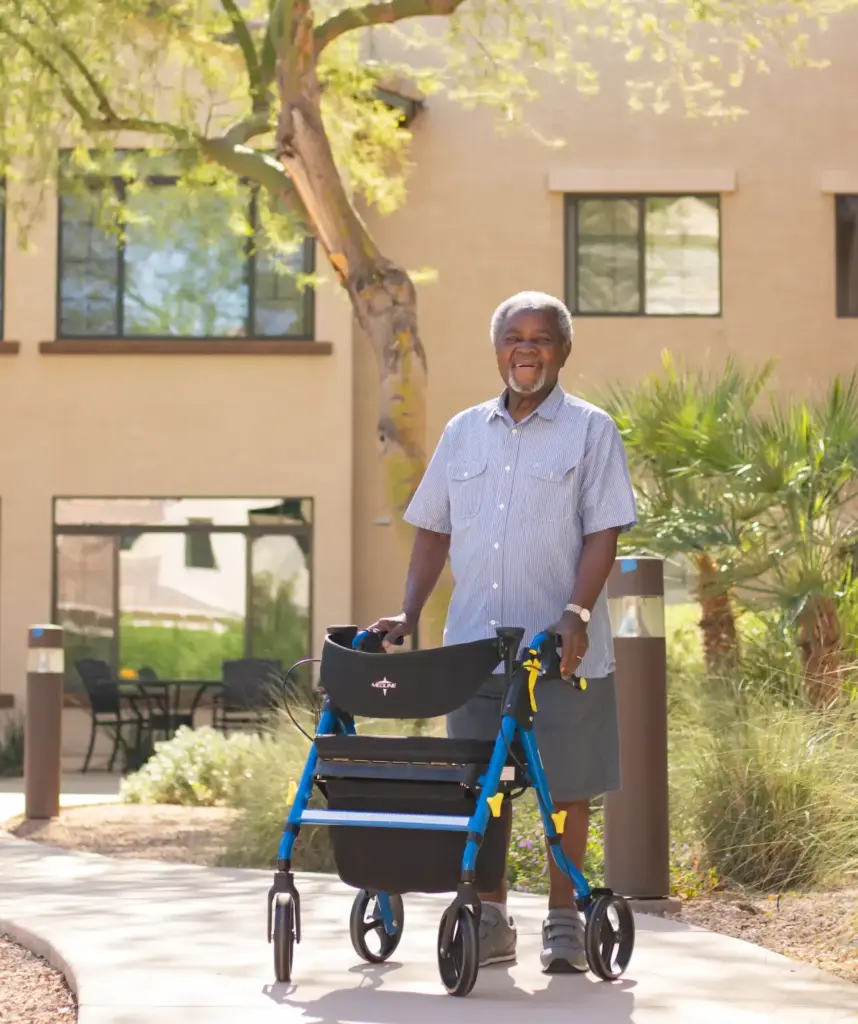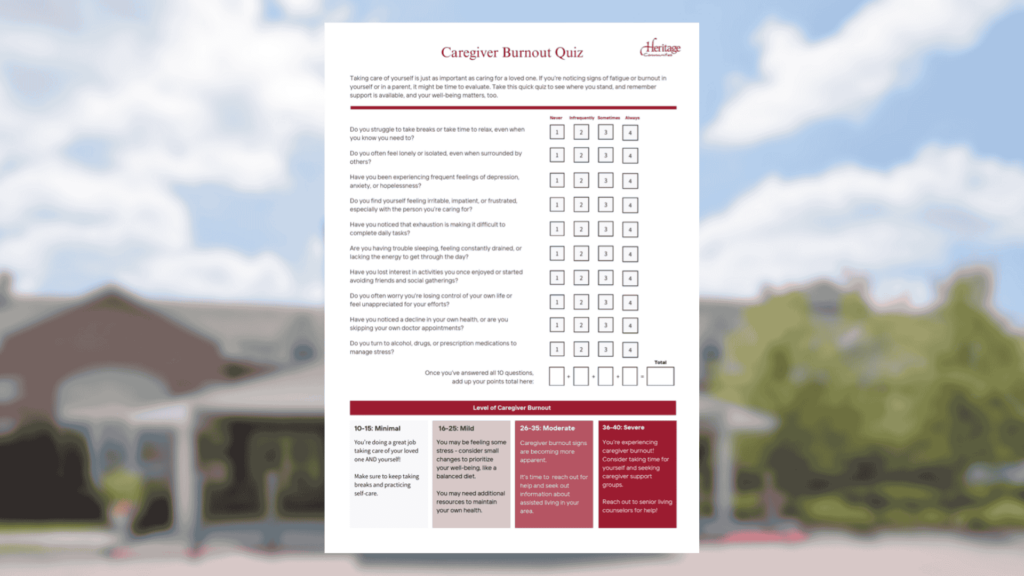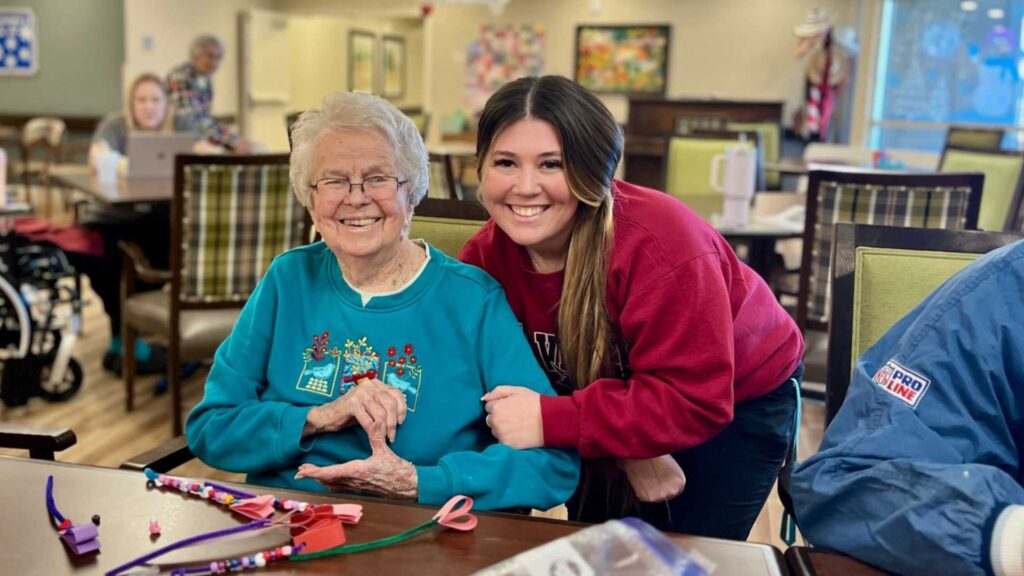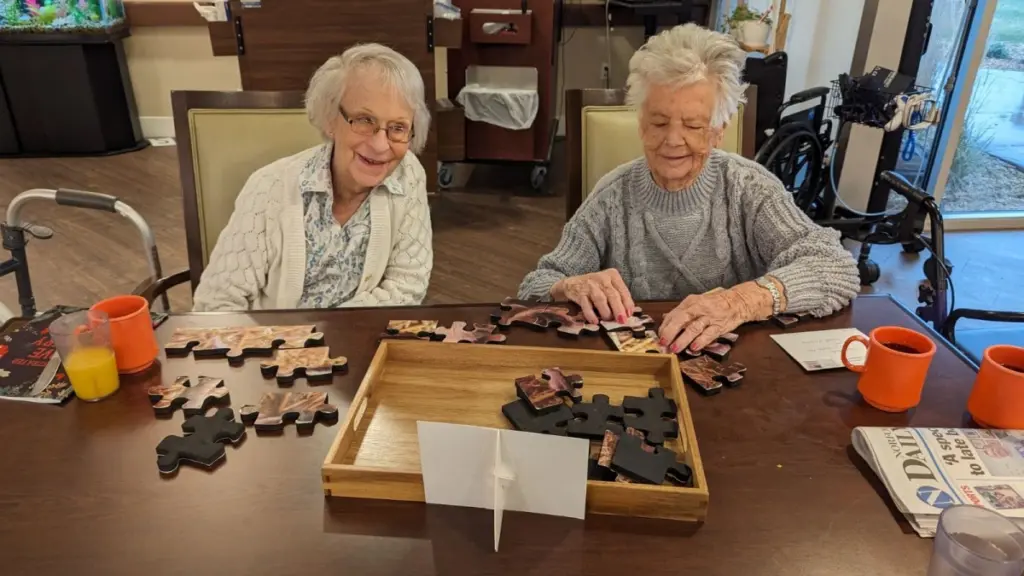Caregiver Burnout Quiz (Free Download!)
Caregiver burnout is real, and should be taken seriously! Taking care of yourself or encouraging a caregiver in your family to rest isn’t selfish. It’s essential. If any of this sounds familiar, take our free caregiver burnout quiz to see how you're doing.
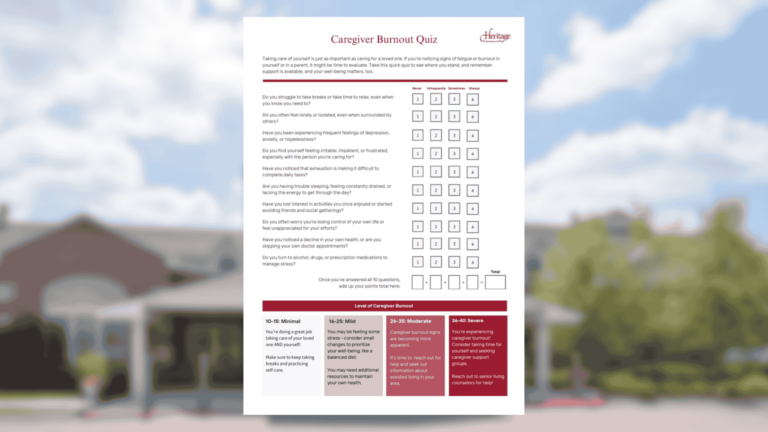
Caring for someone you love is deeply rewarding… but it can also be overwhelming. When the focus is always on someone else’s needs, it’s easy for caregivers to put their own well-being on the back burner… it’s called caregiver burnout. If you’re feeling exhausted, stretched too thin, or even guilty for wanting a break, you’re not alone. And if you’re watching a loved one (a parent, sibling, or spouse) shoulder the weight of caregiving, you might be wondering how to support them.
Caregiver burnout is real, and should be taken seriously! Taking care of yourself or encouraging a caregiver in your family to rest isn’t selfish. It’s essential.
If any of this sounds familiar, it might be time to check in. This quick caregiver burnout quiz can help recognize the signs of caregiver stress and serve as a reminder that support is always within reach.

Caregiver Burnout Quiz
Take a moment to consider each of these ten statements about feelings and behaviors associated with caregiver burnout, and think about how often you (or a caregiver you’re concerned about) are experiencing them. Score a (1) for “never,” a (2) for “infrequently,” a (3) for “sometimes, and a (4) for “always.” At the end, you’ll total your points and find out your risk level for caregiver burnout.
Do you struggle to take breaks or take time to relax, even when you know you need to?
- Never
- Infrequently
- Sometimes
- Always
Do you often feel lonely or isolated, even when surrounded by others?
- Never
- Infrequently
- Sometimes
- Always
Have you been experiencing frequent feelings of depression, anxiety, or hopelessness?
- Never
- Infrequently
- Sometimes
- Always
Do you find yourself feeling irritable, impatient, or frustrated, especially with the person you’re caring for?
- Never
- Infrequently
- Sometimes
- Always
Have you noticed that exhaustion is making it difficult to complete daily tasks?
- Never
- Infrequently
- Sometimes
- Always
Are you having trouble sleeping, feeling constantly drained, or lacking the energy to get through the day?
- Never
- Infrequently
- Sometimes
- Always
Have you lost interest in activities you once enjoyed or started avoiding friends and social gatherings?
- Never
- Infrequently
- Sometimes
- Always
Do you worry you’re losing control of your own life or feel unappreciated for your efforts?
- Never
- Infrequently
- Sometimes
- Always
Have you noticed a decline in your own health, or are you skipping your own doctor’s appointments?
- Never
- Infrequently
- Sometimes
- Always
Do you turn to alcohol, drugs, or prescription medications to manage stress?
- Never
- Infrequently
- Sometimes
- Always

Results for Your Caregiver Burnout Quiz
10-15 Points: Minimal Caregiver Burnout
You’re doing a great job taking care of your loved one AND yourself! Make sure to keep taking breaks and practicing self-care.
16-25 Points: Mild Caregiver Burnout
You may be feeling some stress – consider small changes to prioritize your well-being, like a balanced diet. You may need additional resources to maintain your own health.
26-35 Points: Moderate Caregiver Burnout
Caregiver burnout signs are becoming more apparent. It’s time to reach out for help and seek out information about assisted living in your area.
26-35 Points: Severe Caregiver Burnout
You’re experiencing caregiver burnout! Consider taking time for yourself and seeking caregiver support groups. Reach out to senior living counselors for help!
Recognizing the Signs of Caregiver Burnout
Burnout doesn’t happen overnight… it builds slowly, often without the person realizing it. Here are some common signs to watch out for:
- Emotional Signs: Feeling isolated, anxious, or unappreciated
- Behavioral Changes: Avoiding social activities, neglecting self-care, or feeling resentful
- Physical Symptoms: Chronic fatigue, trouble sleeping, frequent headaches, or getting sick more often
- Cognitive Struggles: Increased irritability, difficulty concentrating, or negative self-talk
If these sound familiar in yourself or someone in your family, it’s time to explore ways to restore balance. Start with giving yourself (or encouraging your loved one) permission to take a break, and then assess your next steps.
Tips for Fighting Burnout and Staying Healthy
Follow these tips if you’re the one providing care, and keep them in mind if you’re keeping an eye on a parent or family member providing help to a senior.
- Prioritize emotional and mental well-being. Talk to a support group, therapist, or trusted friend. Practice mindfulness techniques, such as deep breathing and meditation. Work on reframing your negative thoughts by focusing on what you can do rather than what you can’t. Celebrate small victories, and allow yourself to grieve and process your emotions. If you’re worried about someone else, check in frequently with these ideas and see how they’re holding up.
- Watch out for behavioral and social changes in a caregiver or yourself. Make sure there’s space for regular breaks and scheduled time with friends and family. Set boundaries and engage in your favorite hobbies to improve your mood!
- Maintain good physical and mental health habits. Make sleep a priority by establishing a consistent routine and limiting screen time before bed. Eat nutritious meals to sustain your energy levels, and stay active and hydrated by stretching and drinking plenty of water throughout the day. And make sure to schedule your own appointments to maintain your health.
- Stay on top of psychological responses. Practice self-compassion by reminding yourself you are a good caregiver and that feeling frustrated is natural. Use stress-reducing techniques, such as going for walks and listening to music. Communicate openly with others and adjust your expectations, understanding that not everything will go perfectly each day – and that’s OK.
- Avoid risky coping mechanisms. Replace harmful habits with healthy coping methods such as breathing, journaling, and exercising. If these methods become a problem, consider reaching out to a therapist or joining a support group, especially if you’re aware of yourself or someone else turning to alcohol or other substances to cope. Develop a stress-relief plan by having go-to activities available to help you de-stress.
Finding Balance and Recharging
Many caregivers hesitate to step away, feeling like they “should” be able to do it all. And family members often struggle with how to encourage their loved one to take a much-needed break. But respite care can be a game-changer, offering short-term support while giving caregivers the chance to rest and recharge.
“In my conversations with families, I often meet couples where one spouse has been the primary caregiver—until their own health begins to decline. By the time they turn to assisted living, both partners are struggling, and I can’t help but wonder how different their journey might have been if they had joined our community earlier. With the right support, the caregiving spouse could have maintained their well-being longer, and they both could have enjoyed more quality time together. Senior living isn’t just about care—it’s about preserving health, relationships, and independence for as long as possible.” -Jennifer Dil, Regional Sales Director
Caring for yourself – or encouraging a caregiver in your family to step back – helps everyone. Here’s how to ease the burden:
- Prioritize well-being. Seek support from friends, family, or a therapist. Practice mindfulness, deep breathing, or meditation to reduce stress.
- Stay socially connected. Make time for activities that bring joy. Even a short coffee break with a friend can lift spirits.
- Take care of your health. Eat well, stay active, and ensure enough rest. Don’t put off doctor’s visits.
- Set realistic expectations. No caregiver is perfect, and not every day will go smoothly. Give yourself (or your loved one) grace and focus on what can be controlled.
It may be time to look for assistance. That might mean something as simple as a short respite stay (did you know that was possible?) or a move to an assisted living community like ours.
Resources and Caregiver Support Services With Heritage Communities
We hope this caregiver burnout quiz can help you identify the reasons behind your symptoms and offer strategies to overcome these feelings. Heritage Communities is dedicated to providing resources and support groups within our senior living communities.
With compassion and trust, we;’ll be by your side every step of the way. Take advantage of our caregiver resources and support groups at one of our Heritage Communities. You can also contact us online when you’re ready to learn more about how respite care or assisted living can help.


